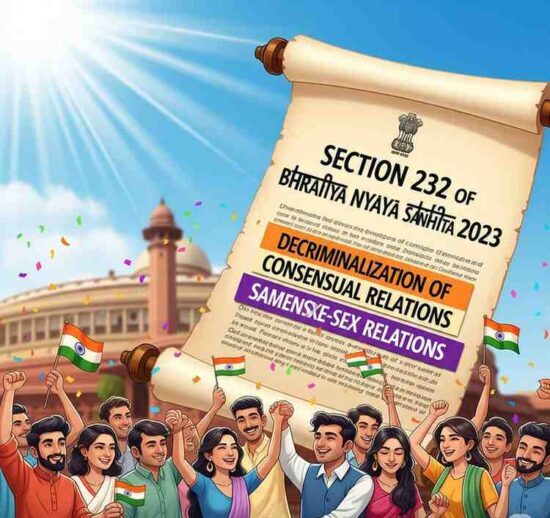Explore Section 232 of the Bharatiya Nyaya Sanhita 2023, which decriminalizes consensual same-sex relations in India, replacing the outdated Section 377.Explore the legal consequences, key court rulings, and the evolution of LGBTQ+ rights recognition in India.
Introduction
In a historic move towards inclusivity and human rights, the Indian government has enacted the Bharatiya Nyaya Sanhita (BNS), 2023, replacing the archaic Indian Penal Code (IPC) of 1860. A significant change under this new legislation is the omission of Section 377, which previously criminalized consensual same-sex relations. This development marks a progressive step in recognizing the rights and dignity of the LGBTQ+ community in India.
Understanding Section 232 of BNS, 2023
While the BNS does not explicitly introduce a new section equivalent to the former Section 377, its omission signifies a decriminalization of consensual same-sex relations.This is in accordance with the Supreme Court’s 2018 ruling in Navtej Singh Johar v. Union of India, where the Court declared that consensual same-sex relations between adults were not an offense under Section 377 of the IPC.
Landmark Judgment: Navtej Singh Johar v. Union of India (2018)
The 2018 Supreme Court ruling was a watershed moment for LGBTQ+ rights in India. A five-judge bench unanimously held that Section 377, in so far as it criminalized consensual sexual conduct between adults, was unconstitutional. The Court emphasized that sexual orientation is an intrinsic part of an individual’s identity and that discrimination on this basis violates fundamental rights guaranteed by the Constitution.
The Court recognized the long-standing injustices endured by the LGBTQ+ community, noting, “History owes an apology to this community and their families for the prolonged delay in addressing the humiliation and social exclusion they have faced over the centuries.”
Implications of Decriminalization
The legalization of consensual same-sex relations triggers significant social, legal, and cultural implications:
- Legal Recognition: Individuals can now engage in consensual same-sex relationships without the fear of legal repercussions.
- Social Acceptance: The move fosters a more inclusive society, encouraging acceptance and understanding of diverse sexual orientations.
- International Standing: Aligning with global human rights standards enhances India’s reputation on the international stage concerning LGBTQ+ rights.
- Policy Reforms: This legal change paves the way for further reforms, including the legalization of same-sex marriages and adoption rights for LGBTQ+ couples.
Challenges Ahead
Despite this significant legal advancement, challenges remain:
- Social Stigma: Deep-rooted societal prejudices continue to affect the LGBTQ+ community, leading to discrimination and marginalization.
- Lack of Comprehensive Legislation: There is no specific law addressing hate crimes, discrimination, or violence against LGBTQ+ individuals.
- Marriage and Adoption Rights: The legal recognition of same-sex marriages and adoption rights is still pending, with the matter yet to be addressed comprehensively by the legislature.
Conclusion
The omission of Section 377 in the Bharatiya Nyaya Sanhita (BNS), 2023, represents a monumental shift in India’s legal landscape, aligning with the Supreme Court’s 2018 judgment and advancing the cause of LGBTQ+ rights. While this change marks progress, it is imperative for the government to introduce comprehensive legislation that ensures equality, protection, and dignity for all citizens, irrespective of their sexual orientation.

























